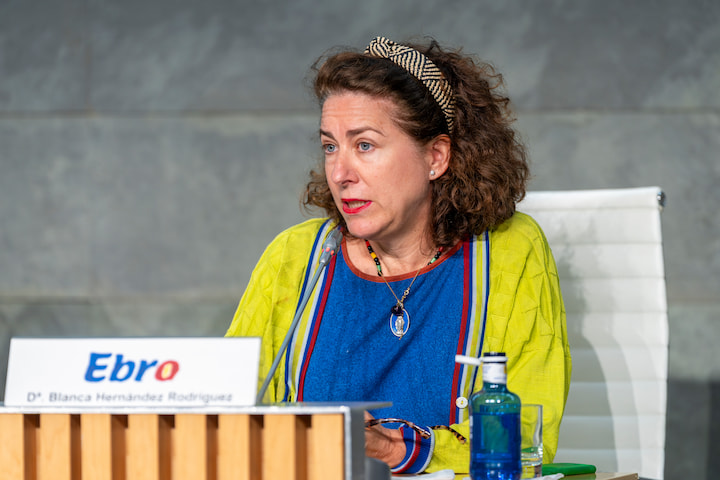During her speech, the Chairwoman of the Ebro Foundation shared the progress made by the Group and the Foundation in sustainability and social responsibility throughout 2024. She highlighted advancements in the RUMBO A 2030 roadmap, with an investment of nearly €20 million in transformative initiatives and strategic partnerships.
In terms of social impact, she emphasized the implementation of 96 projects across Spain, India, Argentina, and Morocco in collaboration with 83 organizations. She also mentioned the donation of €1.25 million worth of food by various Group companies to food banks and associations in 11 countries, alongside healthy eating programs such as the initiative led by La Loma Alimentos in Argentina.
She stressed that more than half of the Foundation’s resources have been allocated to social welfare programs, covering labor integration, mental health support, assistance for the elderly, and aid for women in vulnerable situations, in partnership with third-sector organizations such as Fundación Adecco, Proyecto Hombre, Ashoka, and Fundación Integra.
A key focus was placed on tuTECHÔ, an innovative initiative against homelessness that has provided housing and integration opportunities to more than 3,500 people. In this context, Blanca Hernández underscored the Ebro Foundation’s role as a founding member and patron, as well as its direct involvement in housing sponsorship, training, support, and integration efforts. In just three years since its inception, the program has received seven awards, including the SERES Award, Iberian Property Investment Awards 2025, and the Sabadell Award for Best Social Impact Company of the Year.
She also reaffirmed the Foundation’s commitment to education and employment through scholarships and projects such as Gastronomix, which continues to provide young people at risk of social exclusion with opportunities for the future. Additionally, she highlighted the solidarity shown by the company, the Foundation, and its professionals—from Spain as well as subsidiaries in Italy, France, and the United States—in supporting colleagues in Valencia affected by the DANA floods in Algemesí and Silla, reflecting the human commitment of the organization.
Regarding environmental sustainability, she mentioned the fourth edition of the Fundación Ebro Sustainability Awards, which this year recognized projects from Ebro India and Tilda, as well as the Foundation’s backing of 14 sustainable agriculture projects in countries including Spain, Thailand, India, and Pakistan.
To conclude, she emphasized the ongoing transition toward a more efficient and sustainable business model, with improvements in energy efficiency, water optimization, circular economy, and logistics, achieving a 63% reduction in logistics-related emissions in Spain since 2019.
She closed her speech by expressing gratitude for the efforts of the Group’s teams, the Foundation, and its collaboration with numerous third-sector organizations, noting that “sustainability at Ebro is a strategic line of work that integrates business, responsibility, and forward-looking vision.”
